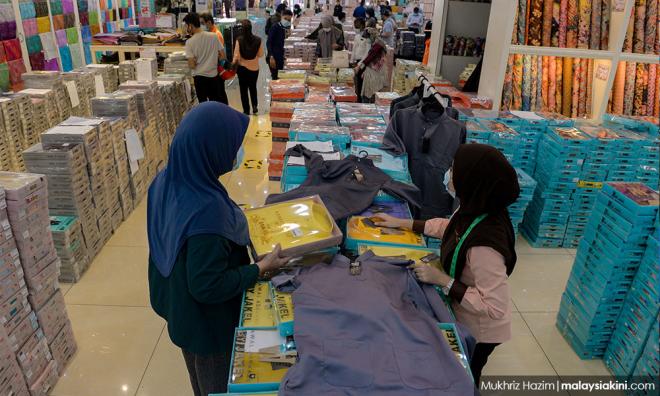
Published by The Malaysian Insight & Malaysiakini, image from Malaysiakini.
SINCE the pandemic that has led to an economic crisis, price levels have fallen down or what economists refer to as deflation. Deflation is defined as an overall decrease in price level so the inflation rate becomes negative. It is generally not a good sign for the economy as it tells us about the state of demand in a country.
Apart from weak global crude oil prices, other global commodity prices also faced declines since February namely the agricultural products such as food and raw materials, and metals and minerals according to data provided by the World Bank.
In April, Malaysia’s inflation rate, measured by Consumer Price Index (CPI), remained in the negative territory with a drop of 2.9% from a year earlier (-0.2% in March). On monthly basis, inflation rate fell 2.7% compared with March.
The sharp drop in prices was mainly hindered by transportation expenses (-21.5%) and spending on housing, water, electricity, gas and other fuels costs (-2.2%).
The downward pressure in prices is justifiable and has been expected since the movement control order (MCO) took place beginning March 18. It has adversely affected businesses and households. Another obvious reason is the low fuel prices.
Would deflation be a boon or a bane to the economy given the unprecedented crisis?
Seeing prices toning down should be a relief to the consumers as it would support purchasing power particularly during this trying time.
For instance, weekly domestic pump prices remain low with RON95 priced at RM1.31 per litre, RON97 at RM1.61 per litre and diesel at RM1.45 per litre, effective from May 16 until May 22.
Not only it helps that most people do not travel much these days because they are either working from home or they only drive at short distances to purchase necessities, and unnecessary inter-state travels are prohibited, those who have started travelling to work also get to save on petrol costs.
The retailers are also putting in efforts to ensure their stocks are cleared by offering steep discounts hence very low prices.
When it comes to prices, consumers tend to be sensitive. That is why some consumers have made complaints that government is not prompt in controlling prices of essential goods. For instance, Penang’s consumer association reported on drastic increase in prices of coriander leaves, parsley and Chinese celery since the start of fasting month.
As comforting as it is for several groups of consumers to witness prices going down, it might not be as accommodative for other groups of consumers. Why is it so?
Due to the gloomy economy, many have lost their jobs or some have their salaries reduced. Therefore, falling prices do not help when people earn less or worse, they end up having no incomes at all.
Since we are currently clueless of the end to the pandemic and businesses need time to recover, there is a possibility that deflation could last for a while as there will be less incentive to hire massively and because of the weak consumer sentiment.
With low prices, business revenues would also dial down. Despite the reopening of most economic sectors beginning May 4, consumer sentiment remains low as most will still be cautious to start spending lavishly or to go out hence affecting retailers.
According to Malaysia Retail Chain Association president Garry Chua, only 20% of the normal shoppers have returned to shops and they have become more restrictive in spending. He also noted that it is unlikely for the retail stores to reach 40% of customers in the next few months.
This pessimistic sales projection shows that it would take time to rebuild consumer confidence and boost spending. Coupled with cautious outlook for global oil prices due to its volatile nature, we could see low inflationary pressures or deflation continue in the upcoming months. Economists are already projecting deflation for this year.
So, can any measures be attempted to try to balance the deflationary pressures and Malaysians’ economic wellbeing?
One of the ways to boost demand is for the central bank to further reduce benchmark interest rate or known as the overnight policy rate which currently stands at 2.00%. This is possible given that inflationary pressures are low and downside risks to economic growth are still present. As stated by the central bank itself, Bank Negara Malaysia’s monetary policy stance is to maintain price stability while remaining supportive of growth.
Besides that, the government also needs to constantly keep prices in check for the essential goods. By this, the implementation of Maximum Price Control Scheme should not be done only during festive seasons but also during normal days in the process of recovering the economy.
Not to forget, businesses also need the support while trying to recover consumer spending. With the ongoing distribution of RM260 billion stimulus package, the government has to ensure the delivery mechanism is timely such as the loan approvals for special relief facility and the micro-credit loan scheme.
There appears to be pros and cons resulting from the deflationary pressures experienced by the economy as a whole, households and businesses. Various measures, either direct or indirect, can be pursued on for us to adjust to the current economic environment while monitoring the inflation development.
Nur Sofea Hasmira Azahar is Research Analyst at EMIR Research, an independent think tank focused on strategic policy recommendations based on rigorous research.

